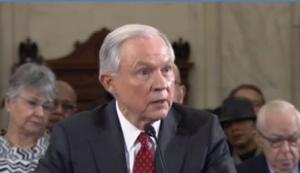Considered opinionJeff Sessions just confessed his negligence on Russia
The headlines from Attorney General Jeff Session’s testimony before the Senate Judiciary Committee on Wednesday focused on his refusal to answer questions about his conversations with President Donald Trump and his declaration that he had not yet been interviewed by special counsel Robert Mueller. Lost in the back-and-forth, however, was a truly damning moment about Sessions’s tenure at the Justice Department thus far. The attorney general of the United States, though acknowledging and expressing confidence in the intelligence community’s assessment of foreign interference in the 2016 election and admitting that the government is not doing enough to guard against such activity in the future, could not identify a single step his department is taking or should take in that direction. This was a frank display of ignorant complacency in the face of a clear and demonstrated threat.

Attorney General Jeff Sessions testifying before Congressional committee // Source: yahoo.com
The headlines from Attorney General Jeff Sessions’s testimony before the Senate Judiciary Committee on Wednesday focused on his refusal to answer questions about his conversations with President Donald Trump and his declaration — dragged out of him with all the elegance of a tooth extraction — that he had not yet been interviewed by special counsel Robert Mueller. Lost in the back-and-forth and amid focus on his testy exchange with Sen. Al Franken about Russian contacts, however, was a truly damning moment about Sessions’s tenure at the Justice Department thus far.
Susan Hennessey and Benjamin Wittes write in Foreign Policy that tThat moment came not in the context of hostile questioning from a committee Democrat but in a perfectly cordial exchange with Republican Sen. Ben Sasse.
Hennessey and Wittes continue:
With Midwestern gentility, the Nebraska senator told Sessions that he wasn’t going to grill him about Russian interference in the 2016 presidential election. Rather, he said, “I would like to continue talking about the Russians but in the context of the long-term objectives that Vladimir Putin has to undermine American institutions and the public trust.… We face a sophisticated long-term effort by a foreign adversary to undermine our foreign policy and our ability to lead in the world by trying to undermining confidence in American institutions.”
Russia will be back in the 2018 and 2020 election cycles, Sasse argued. “We live at a time where info ops and propaganda and misinformation are a far more cost-effective way for people to try to weaken the United States of America than by thinking they can outspend us at a military level.… So as the nation’s chief law enforcement officer and as a supervisor of multiple components of our intelligence community … do you think we’re doing enough to prepare for future interference by Russia and other foreign adversaries in the information space?”
You’d think this question would be a golden opportunity for Sessions. After all, if you’re a man who has had some — ahem — inconvenient interactions with former Ambassador Sergey Kislyak, you might relish the chance to answer a question about what you are doing to prevent Russian interference in the future, as a chance to go on offense and show how serious you are about tackling a problem that has undermined your reputation.
